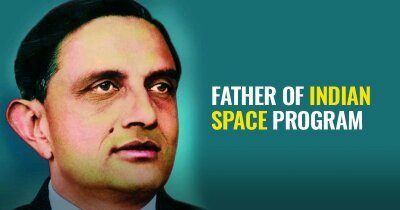Remembering Dr. Vikram Sarabhai: The Visionary Founder of ISRO
Dr. Vikram Sarabhai’s contribution to India’s space exploration program is immeasurable. He laid the foundation for the Indian Space Research Organization (ISRO) and set India on its path to becoming a space superpower. This article pays homage to the visionary founder, Dr. Vikram Sarabhai, and discusses the significance of his work in the context of various government exams, including those for teaching, police officers, banking, railways, defense, and civil service positions like PSCS to IAS.

Why this News is Important:
Dr. Vikram Sarabhai’s Legacy: Dr. Vikram Sarabhai is an iconic figure in the field of space science and technology. His pioneering efforts in establishing ISRO have not only made India proud but also opened up new career opportunities in space research and technology. Aspiring civil servants, teachers, and candidates in various government positions should be familiar with his legacy.
Relevance to Government Exams: Government exams often include questions related to the history of important organizations and personalities. Dr. Sarabhai’s role in ISRO’s founding is a crucial aspect of India’s technological history, making it a potential topic for exams.
Space Technology and National Security: In today’s world, space technology plays a critical role in national security. Police officers, defense personnel, and civil servants need to understand the significance of India’s space program, which was initiated by Dr. Sarabhai.
Historical Context:
Dr. Vikram Sarabhai was born on August 12, 1919, in Ahmedabad, India. He was a visionary scientist, physicist, and astronomer who played a pivotal role in shaping India’s space program. In 1969, he founded the Indian National Committee for Space Research (INCOSPAR), which later evolved into ISRO. Dr. Sarabhai’s vision was to harness space technology for the benefit of India’s socioeconomic development.
Under his leadership, India successfully launched its first satellite, Aryabhata, in 1975. His commitment to peaceful uses of space and international cooperation laid the foundation for India’s space diplomacy.
Key Takeaways from “Remembering Dr. Vikram Sarabhai: The Visionary Founder of ISRO”:
| Serial Number | Key Takeaway |
|---|---|
| 1 | Dr. Vikram Sarabhai was the visionary founder of ISRO. |
| 2 | His contributions are relevant to various government exams. |
| 3 | India’s space program owes much of its success to him. |
| 4 | Dr. Sarabhai’s legacy continues to inspire future scientists. |
| 5 | Understanding his work is crucial for national security. |
Important FAQs for Students from this News
Q1: Who was Dr. Vikram Sarabhai, and why is he significant in Indian history?
A1: Dr. Vikram Sarabhai was a visionary scientist and the founder of ISRO. He is significant for initiating India’s space program and contributing to its scientific and technological advancements.
Q2: How can knowledge of Dr. Sarabhai’s work be beneficial for government exam candidates?
A2: Understanding his legacy can help candidates answer questions related to India’s technological history, space programs, and the importance of space technology in national security.
Q3: What was the main achievement of ISRO under Dr. Sarabhai’s leadership?
A3: ISRO’s successful launch of its first satellite, Aryabhata, in 1975 is one of the key achievements under Dr. Sarabhai’s leadership.
Q4: What was Dr. Sarabhai’s vision for India’s space program?
A4: Dr. Sarabhai’s vision was to harness space technology for India’s socioeconomic development and promote peaceful uses of space.
Q5: How does knowledge of Dr. Sarabhai’s work inspire future scientists and students?
A5: Learning about his contributions can motivate students to pursue careers in science and technology and make them aware of the opportunities in space research.
Some Important Current Affairs Links















